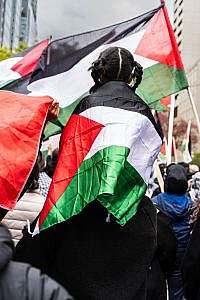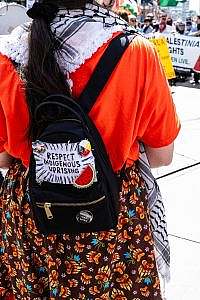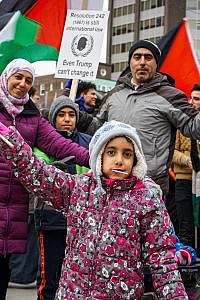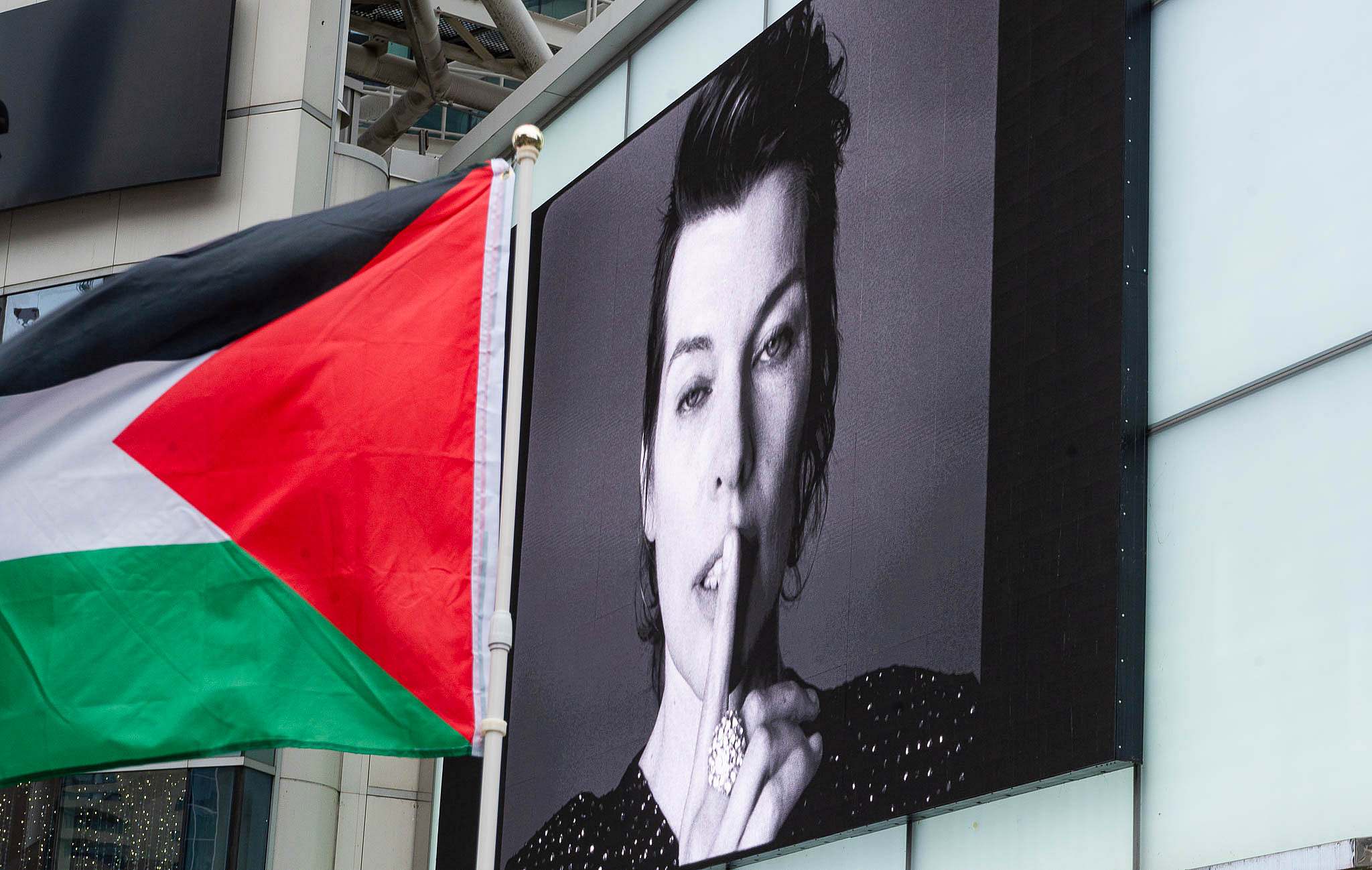An Awakening: The war on Gaza is lifting the veil for Muslims in educational spaces
We have recently commemorated the one-year anniversary of the ongoing war on Gaza. On this occasion, our research team decided to highlight the findings related to the ongoing atrocities imposed on the people of Gaza, which emerged during a broader study exploring the experiences of Muslims in Ontario schools.
Data from the Islamic Schools Association of Canada shows a spike in waiting lists across all Islamic schools in the country, even in those with less-than-ideal facilities. Muslim students and their families have largely lost confidence in public schools. This loss of confidence extends beyond the parents of Muslim students attending public schools to include Muslims working in educational spaces, such as administrators, teachers, staff, and professors.
Below are five insights on Muslims working in educational settings and their experiences with their organizations’ responses to the war over the past year[1].
1. Double standards in schools and educational institutions
Muslim educators in their respective educational institutions have witnessed a systemic double standard. During the Ukraine crisis, university presidents sent messages of peace and solidarity with Ukraine, and multiple fundraising initiatives were organized by both universities and students. However, 20 months later, when Israel began its bombardment on Gaza, which has overwhelmingly harmed and killed innocent civilians, there was silence, with the exception of vague messages that did not explicitly condemn the attacks on Gaza’s civilian population and infrastructure.
 Teachers have witnessed colleagues and ‘progressives’ who advocate for social justice and human rights remain silent when it comes to Palestine and Palestinians. One high school teacher we spoke with noted that school administrators not only lacked empathy towards Muslim students who may have been experiencing emotional difficulties and challenges because of the massive civilian casualties in Gaza but also exerted pressure to censure students or educators who attempted to speak out against the plausible genocide taking place in Gaza. Another teacher noted that she felt “you have no right to criticize” the actions of the state of Israel, while another teacher stated, “We have gotten a much clearer perspective on how society sees us. This is what’s happening in Palestine, and it’s what’s happening everywhere where people of colour or Muslim people are suffering. You can see a very clear divide in how people respond.” News articles also show students being marginalized for standing up for Palestine. For example, in Oakville, Ontario, a high school student was berated by a teacher and subjected to anti-Palestinian, Islamophobic vitriol for wearing a traditional keffiyeh.
Teachers have witnessed colleagues and ‘progressives’ who advocate for social justice and human rights remain silent when it comes to Palestine and Palestinians. One high school teacher we spoke with noted that school administrators not only lacked empathy towards Muslim students who may have been experiencing emotional difficulties and challenges because of the massive civilian casualties in Gaza but also exerted pressure to censure students or educators who attempted to speak out against the plausible genocide taking place in Gaza. Another teacher noted that she felt “you have no right to criticize” the actions of the state of Israel, while another teacher stated, “We have gotten a much clearer perspective on how society sees us. This is what’s happening in Palestine, and it’s what’s happening everywhere where people of colour or Muslim people are suffering. You can see a very clear divide in how people respond.” News articles also show students being marginalized for standing up for Palestine. For example, in Oakville, Ontario, a high school student was berated by a teacher and subjected to anti-Palestinian, Islamophobic vitriol for wearing a traditional keffiyeh.
Schools are not neutral spaces; schools are political. While the United Nations and other humanitarian organizations around the world have described what is happening in Gaza as a genocide, individuals in educational spaces and beyond are being silenced, doxed, and punished for using the G-word in their respective workplaces.
2. The invisibility of Muslim identity and experience
The ongoing war in Gaza has made it clear to Muslims that their identity and experiences are neither valued nor welcomed in schools. Even though schools have promoted identity-focused work in recent years, one teacher who was advocating for students who were silenced shared that her principal told her, “If you do not focus on identity-focused work, your job is on the line.’ And I looked at her and said, ‘Exactly! I am focused on identity work. There are Palestinian students in this school whose identities are being silenced. Identities are being ignored.” These comments allude to how there are attempted erasures in schooling spaces of Palestinian and Muslim identity. Promoting these identities is either unacknowledged or potentially punished.
Teachers we spoke to indicated that Muslim students in their schools felt that there was a hierarchy of values and beliefs promoted in their schools. If one’s political views aligned with those promoted in legacy and mainstream media, along with the dominant political classes, they were allowed to express and highlight them. However, if aspects of their beliefs and values in relation to the political climate were perceived as disruptive, they were silenced and unwelcome. One teacher reflected on their experience: “The students and teachers had no support from administrators. It was as though we didn’t exist, that we were invisible, that the genocide wasn’t happening. Life continued, and all the trauma and heartache our students felt was ignored. I learned that our board is performative—this is truly what I learned.”
3. The deliberate separation of Canada’s Indigenous plight, TRC, and Palestine
In the last week of September, we observed the National Day for Truth and Reconciliation, during which most schools across the country participated in the “Every Child Matters” Orange Shirt Day to commemorate the occasion. Although the plight of Indigenous peoples in Canada bears similarities to that of the Palestinians, in terms of both contexts being undergirded by violent settler-colonialism and widespread displacement, teachers and professors were unable to make these connections for their students. One teacher noted, “While we are conducting Indigenous workshops, discussing the effects of colonialism, Kamloops residential schools, and residential schools across Canada… how is this different from what these [i.e. Muslim and Palestinian] students are speaking about? They have families in those countries who are directly affected. By silencing them, you’re silencing their lived experiences. We are supposed to honour our students’ lived experiences, and these experiences are not being honoured.”
4. The distinction between “educating” and engaging in meaningful dialogue
Muslims usually appreciate when others show interest in learning about their religion, way of life, or lived experiences, as it aligns with the concept of dawah—the responsibility to share knowledge about Islam with others. One teacher shared an interaction with a non-Muslim colleague who was genuinely concerned: “He just asked me, ‘How is your family?’ Some teachers genuinely ask how everything is going and how we are doing.” The teacher then explained the history of Palestine and the state of his family, who reside there.
However, Muslim teachers, students, and professors are becoming increasingly cautious about “educating” others when they detect maliciousness, performativity, or apathy: “I used to give my white colleagues the benefit of the doubt, thinking they might not understand the nuances of the war—perhaps they were ignorant…But then I thought, most of my white colleagues don’t even ask about me or acknowledge the death of my people, the death of innocent civilians and babies. Now, I don’t want to waste my breath educating people in this school because I believe they don’t deserve my time and energy.”
The general public is often afforded the benefit of the doubt, but those in positions of power—especially teachers and professors who have students and colleagues from regions impacted by conflicts and humanitarian catastrophes —should not remain ignorant. People of colour do not have the privilege of being unaware and ignorant of such issues, as they are, more often than not, somehow affected. Ignorance, neutrality, apathy, and being apolitical are luxuries of the privileged. Becoming political is a moral imperative when over 40,000 people have been needlessly killed, and the potential for more civilian loss of life increases exponentially due to the lack of access to medical care, food, and clean water. The essence of DEI is to actively confront injustices and engage in critical conversations to disrupt and dismantle systems of oppression, then rebuild better systems.
Having a meaningful, genuine conversation is one thing, but ‘educating’ educators who lean on the privilege of remaining ‘neutral,’ despite their responsibility to their students, is something else entirely.

5. A strong sense of pride and camaraderie in what they believe in
Muslims in educational spaces did not just experience egregious incidents over the past year; they also learned heartwarming lessons. They have witnessed camaraderie and solidarity from many, including Jewish Voices for Peace and Code Pink, as well as multiple protests in subway stations by Jewish allies chanting, ‘Not in my name.’ This is hardly surprising, as Jews and Muslims over the past 1400 years have lived peacefully side by side in communities around the world, including Palestine.
The diversity and perseverance of protestors and activists from all backgrounds, including Jews, Sikhs, Christians, atheists, and members of other religious, ethnic, and cultural groups over the past year has been inspiring. Despite the threats of being silenced, doxed, and punished, these voices are growing louder and stronger, as more innocent blood is being needlessly spilled. Perceptions around Palestinians being villainous and bloodthirsty terrorists are also being challenged due in large part to footage from primary sources on the ground in Gaza. The world is witnessing the courage and perseverance of Palestinian men, women, and children. One teacher mentioned that a relatively shy male student who attended a recent protest cheered with a smile, lifting his arm and saying, ‘I am Palestinian.’ Another teacher from a school with a large Muslim population noted that the war on Gaza awakened a sense of perseverance she had never seen in her students before. She continued to say that she overheard two students. One asked, ‘The war in Gaza is still going on?’ The other student answered, “Yes … it has been almost a year, and they have not been able to defeat them.”
Muslims spoke about the strong identity-affirming spaces that emerged organically when attending a myriad of protests, from walkouts to standing outside embassies complicit in the unfolding genocide. They felt the solidarity and the stance on Justice, with protests occurring every weekend in every major city around the world for the past year, in both hot and cold seasons. They felt the camaraderie in these spaces while chanting, drumming, wearing keffiyehs, and waving Palestinian flags. Though there is much to grieve about over the past year, there is still hope that the tide is turning.

Dr. Asma Ahmed is an Assistant Professor and chair of the Bachelor of Education program at Niagara University Ontario.
Dr. Naved Bakali is an Assistant Professor of Anti-Racism Education at the University of Windsor. He’s the author of, Islamophobia: Understanding anti-Muslim racism through the lived experiences of Muslim youth (Brill/Sense 2016) and co-editor of The Rise of Global Islamophobia in the War on Terror: Coloniality, race, and Islam (Manchester University Press 2022).
Dr. Zuhra Abawi is an Assistant Professor and chair of the Department of Educational Leadership at Niagara University Ontario.
[1] Although our study of the experiences of Muslims in schools did not focus on the war or Palestine, many themes emerged about the war that could not be ignored. However, some of our readers might wonder why Muslims are so concerned about the issue of Palestine.While this goes beyond the scope of this article, for the sake of providing some context, and also at the peril of being too simplistic, it is important to highlight that Palestine holds significance for Muslims for two primary reasons: (1) its religious sanctity, particularly Al Aqsa Mosque; and (2) Palestinians are the indigenous inhabitants of their land and have been attacked for refusing to give it up.

